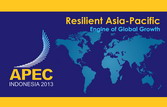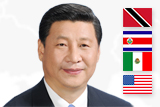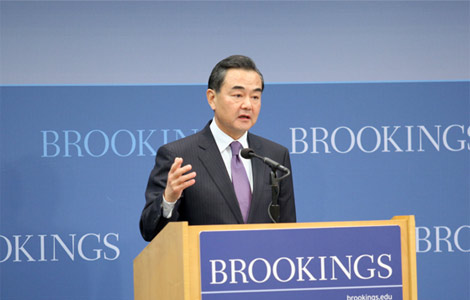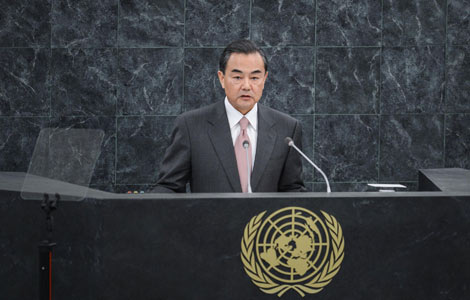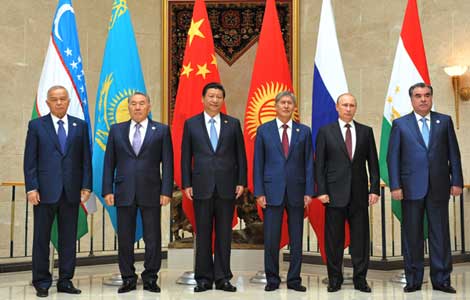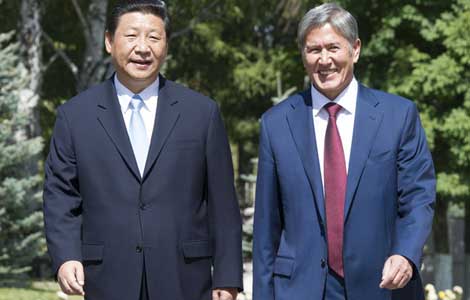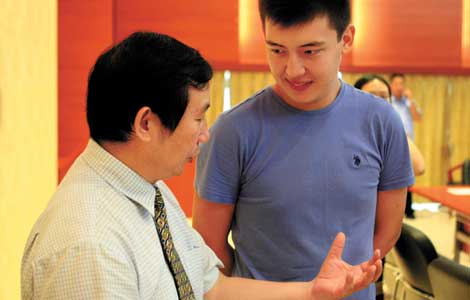Xi's written interview with Indonesian and Malaysian media
By ( Xinhua )
Updated: 2013-10-02
BEIJING - Chinese President Xi Jinping gave a joint written interview to media from Indonesia and Malaysia on bilateral relations, the 21st leaders' meeting of the Asia-Pacific Economic Cooperation (APEC), economic development prospect of Asia-Pacific region, China's economic situation, and the relationship between China and the Association of Southeast Asian Nations (ASEAN), before his state visits to these two countries, and attendance to the APEC leaders' meeting.
The media include Indonesia's Jakarta Post and Kompas, Malaysia's Utusan Malaysia, Sin Chew Jit Poh, and New Straits Times.
Following is the full text of the interview:
1. We have noticed that Indonesia is the first stop of your first visit to Southeast Asia as China's President. What are your expectations for the visit? The national football teams of China and Indonesia will compete in the 2015 Asian Cup Qualification in Jakarta in mid October. I heard that you are a football fan. What is your forecast of the result of the match?
Indonesia is a beautiful country known as the "Emerald of the Equator". Indonesian folksongs such as "Ayo Mama" and "Sing Sing So" are very popular in China. I was in Indonesia some twenty years ago, and was deeply impressed by the dynamic growth of this country, which was called one of the four "little tigers" in Asia.
Since the end of the 20th century, Indonesia has worked hard to tide over the impact of the Asian financial crisis and the international economic and financial crisis, and has turned itself into a remarkable emerging market economy with political stability, economic growth, social progress and ethnic harmony.
It has been 63 years since China and Indonesia established diplomatic relations. Bilateral ties have traversed an extraordinary course. Since the start of the 21st century, particularly since the establishment of strategic partnership between the two countries in 2005, our dialogue and cooperation across the board have embarked on a new journey of comprehensive and rapid development. Between 2005 and 2012, the two countries put in place multi-tiered and multi-field cooperation mechanisms including vice prime ministerial dialogue, defense consultation and maritime cooperation. Bilateral trade volume reached US$66.2 billion, four times that of 2005. China's direct investment in Indonesia increased 10 times to US$2 billion. And personnel exchanges between the two countries rose three times to 1.33 million person-times. The two sides also worked closely on regional and international affairs and effectively safeguarded the common interests of the developing countries.
Both China and Indonesia are major developing countries in the region, and their strategic cooperation carries a great significance and boasts a broad prospect. The purpose of my state visit to Indonesia is to carry forward our traditional friendship and plan for our cooperation. I look forward to an in-depth exchange of views with President Susilo on ways to advance our friendship and cooperation on all fronts and bring China-Indonesia relations to a new high.
Talking about football, it is a team sport that calls for good coordination. Important as individual skills are, team work holds the key to the result of the match. That's one of the reasons why I like football. The charm of the game also lies in its unpredictability as the situation on the ground may change every minute it goes. I hope that the national teams of China and Indonesia will present an enjoyable, friendly and spectacular match. I also hope that the two teams will make it to the World Cup finals in the not-so-distant future.
2. Both China and Malaysia have put in place a new government this year. How do you see the current China-Malaysia relations and what are your expectations for the future course of this relationship?
China-Malaysia relations have come a long way in recent years and are well on track to an all-round, steady and results-oriented expansion. China has been Malaysia's largest trading partner for four consecutive years, and Malaysia China's largest trading partner in ASEAN for five years running. In 2012, two-way trade reached a historical high of US$94.8 billion. Malaysia is expected to become the third Asian country, following Japan and the ROK, with a bilateral trade volume with China topping US$100 billion. The opening of the China-Malaysia Qinzhou Industrial Park and the Malaysia-China Kuantan Industrial Park made history in the mutual establishment of state-level industrial parks between China and ASEAN countries. Financial cooperation between the two countries has registered fast growth. We have signed a bilateral currency swap agreement worth RMB180 billion which helped put our business cooperation on a solid footing. People-to-people exchanges continued to expand with annual personnel exchanges exceeding two million person-times for three year running and the number of exchange students topping 15,000. Cooperation between China and Malaysia has brought benefits to both sides.
At present, both China and Malaysia are working hard to improve the people's living standards and achieve national development. China is ready to work together with Malaysia so as to create a better future for both sides. I look forward to in-depth exchange of views with Malaysian leaders on ways to promote all-directional cooperation and build a stable framework for long-term and sound growth of our bilateral relations. I am convinced that with our joint efforts, China-Malaysia strategic cooperation will grow from strength to strength and bring greater benefit to the two peoples.
3. The 21st APEC Economic Leaders' Meeting will be held on October 7-8 in Bali, Indonesia. What do you expect from this meeting? China will host the APEC meeting next year, and could you share with us China's ideas on hosting that event?
The world economy has entered a period of deep readjustment with all regions facing opportunities and challenges in the course of development. The Asia-Pacific region, which has played a leading role in promoting global economic recovery, remains the world's most dynamic and most promising region. APEC, the most influential economic cooperation organization in the region, which attracts the highest level of participation and covers the widest range of areas of cooperation, has played an important role in advancing exchanges, cooperation and economic integration in the Asia-Pacific region.
China hopes that the 21st APEC Economic Leaders' Meeting to be held in Bali, Indonesia will focus on the region's leading role in global economic recovery while endeavoring to achieve three objectives. First, to shore up international community's confidence in the development of the Asia Pacific. Second, to give greater play to APEC's leading and coordinating role and upgrade the standing of APEC. Third, to facilitate more positive results at the meeting in supporting the multilateral trading regime, coordinating regional free-trade arrangements and promoting connectivity and infrastructure development in the region.
China will host the 22nd APEC Economic Leaders' Meeting in 2014. We expect to use the occasion to do the following: encouraging APEC economies to build closer partnerships in an open, inclusive and win-win spirit, promote a greater leadership role for APEC, promote greater progress in Asia-Pacific integration, and plan for the long-term development of and win-win cooperation in the region; strengthening macro economic policy coordination by APEC members, information sharing and exchanges among regional free trade arrangements and coordination in regional economic integration; advancing transformation and growth by intensifying innovation-led development, seeking growth from transformation and facilitating transformation through growth so as to inject greater vigor and vitality to the region's development; continuing to promote all-directional infrastructure and connectivity development by addressing the salient problems, promoting regional and subregional cooperation through connectivity and shaping an economic pattern conducive to Asia-Pacific integration.
China is ready to maintain close communication with all parties to ensure the success of the 2013 and 2014 APEC Economic Leaders' Meetings and make greater contribution to the development and prosperity of the Asia Pacific.
4. Recently, with the occurrence of fluctuations in the financial markets of some emerging economies in the Asia Pacific, uncertainties in economic growth have been on the rise. At the same time, the Chinese economy has slowed down. These have led to rising concerns on the part of the international community about the economic outlook in the Asia Pacific and economic downturn in China. What is your view on this?
The recent financial fluctuations in some emerging economies in this region are largely caused by external factors, which have affected market expectations and led to withdrawal of international capital. We call on major developed economies to adopt responsible macro economic policies so as to avoid negative spillover effects. At the same time, emerging market economies also need to enhance risk preparedness and resistance capabilities. It is important to stress here, however, that the shared desire of the Asia-Pacific region for peace, stability and development has remained unchanged; that the historical trend of a rising Asia Pacific in the world both politically and economically has not changed; and that the driver and potential dynamism for a sustained and rapidly growing Asia-Pacific economy has not changed.
We have reasons to believe that the Asia-Pacific region has a bright future. All APEC members should work steadily to ensure that the region will continue playing its leading role in a full recovery and healthy growth of the world economy.
In the first half of this year, China's economy registered a year-on-year growth of 7.6%, slightly lower than previous months. The Chinese government has, of its own accord, introduced measures of readjustment. We made a determined decision to stabilize growth, readjust the structure and deepen reform. No longer taking GDP as the sole measurement of success, we are focusing more on the quality and efficiency of growth. The measures of readjustment and transformation today are aimed at achieving a growth tomorrow that is sounder, more sustainable and of even higher quality.
Comparatively speaking, China's growth is not slow. It is perhaps among the fastest in the Asia Pacific and even the world. The Chinese government has full confidence in achieving a sustained and sound economic development. A Chinese economy that is on track of sustained and sound growth will inject fresh impetus to global economic recovery and make greater contribution to the common development and prosperity of the Asia Pacific.
5. Economic integration in the Asia Pacific is gaining momentum, as evidenced by the mushrooming regional free trade agreements such as the Trans-Pacific Partnership Agreement (TPP) and the Regional Comprehensive Economic Partnership (RCEP). What is your view on Asia-Pacific economic integration? What role can APEC play?
Asia-Pacific economic integration has presented a beautiful vision of highly integrated regional economy and in-depth expansion of Asia-Pacific cooperation. This is the mission shared by all APEC members and a grand goal for the future development of the Asia-Pacific region.
Free trade arrangements are mushrooming in the region, which is a positive sign for the in-depth development of regional integration. We should expand market openness and deepen regional economic integration through development of such regional free trade arrangements.
As a Chinese saying goes, "the ocean is vast because it admits hundreds of rivers". China has always actively supported and participated in the process of Asia-Pacific economic integration, always upholding an open attitude to any mechanism or arrangement that is conducive to the process. At the same time, we believe that in developing FTAs, the parties should cherish the principles of openness, inclusiveness and transparency and, in particular, demonstrate flexibility for economies at different development stages, so as to offer more options for integration.
As the top-level, broadest and most influential economic cooperation organization in the Asia Pacific, APEC should play a leading and coordinating role in promoting information sharing, transparency and openness among the various free trade arrangements so that they could learn from one another, promoting, reinforcing, and complementing one another to create favorable conditions for the eventual economic integration in the Asia Pacific.
6. This year marks the 10th anniversary of the establishment of China-ASEAN strategic partnership. Over the past decade, relations between the two sides have come a long way. There is great interest in their future development direction, including ways to handle the South China Sea issue. How do you see the prospect of China-ASEAN relations in the next ten years?
China and ASEAN countries are linked by the same mountains and rivers and live alongside each other like members in one big family. The friendly exchanges between the two sides date back to a long time ago. This year marks the 10th anniversary of the China-ASEAN strategic partnership. The past decade saw mutual respect, equality, good-neighborliness, friendship and mutually beneficial cooperation as the defining features of relations between the two sides. Indeed the relationship has already gone beyond the bilateral scope and, as the bedrock for a prosperous and stable East Asia, taken on important regional and global significance.
Pursuing a foreign policy of fostering friendship and partnership with its neighbors, China is committed to bringing more benefits to the surrounding areas with its own development. We will unswervingly take ASEAN as a priority in our neighborhood diplomacy, deepen strategic partnership with ASEAN, and work with ASEAN to safeguard peace and stability in this region, including in the South China Sea. As for the differences and disputes between countries, China has always stood for their proper resolution through friendly negotiations and dialogue, and will work unremittingly to this end. China will continue to support ASEAN' s development, its community building and its centrality in East Asia cooperation.
As emerging markets in Asia, China and ASEAN are linked together by common destiny. Moreover, we hold out much hope for sustained economic growth in the region and the world as a whole. As developing economies, both China and ASEAN face a top task of growing the economy and improving people's livelihood. Our cooperation is aimed not only at creating broad horizon and inexhaustible business opportunities for ourselves, but also at making greater contribution to world prosperity and stability.
China-ASEAN relations have a tremendous growth potential and prospect of expansion. I suggest that the two sides work on the following in the immediate future: First, maintain high-level exchanges, enhance strategic communication and promote mutual trust. Second, elevate the level of China-ASEAN Free Trade Area by opening up our markets still wider to each other and advancing trade and investment liberalization and facilitation. Third, promote connectivity, establish an investment and financing platform for infrastructure development in Asia and resolve the bottleneck in this area. Fourth, give greater role to the China-ASEAN Maritime Cooperation Fund and carry out results-oriented maritime cooperation. Fifth, deepen defence and security cooperation, improve the mechanism for meetings between defence ministers of China and ASEAN countries, and actively promote exchanges and cooperation between the law enforcement and security authorities, so as to jointly safeguard peace and tranquility in this region. Sixth, step up people-to-people exchanges at various levels, especially those involving ordinary people in the interest of strengthening mutual understanding and friendship, so as to cement the popular and society-wide support for China-ASEAN friendly and good-neighborly relations. Seventh, step up coordination in international and regional affairs, work jointly to safeguard the rights and interests of developing countries and promote democracy in international relations.
7. ASEAN countries share the hope that China will stick to the path of peaceful development and that the Chinese dream and the dreams of other countries for better life and national development will reinforce each other. What's your comment?
The Chinese nation, over the past millennia, has formed such values as universal love, non-aggression, amity with neighbors, peace being most precious and harmony without uniformity. China has pursued a foreign policy of developing friendship and partnership with its neighbors, which has contributed significantly to Asia's stability and prosperity. In today's world, economic globalization and regional economic integration are gaining momentum and Asia has become an important engine driving world economic growth. Maintaining stability and development in Asia serves the interests of all Asian countries, China included, and China's destiny has long been closely connected with those of other Asian countries.
The Chinese people are striving to realize the Chinese dream of achieving the great renewal of the Chinese nation. Our goal is to complete the building of a moderately prosperous society in all respects by the centennial of the Communist Party of China and to turn China into a modern socialist country that is prosperous, strong, democratic, culturally advanced and harmonious by the centennial of the People's Republic of China. To attain this goal, we need a peaceful and stable neighboring environment.
For us, pursuing the path of peaceful development is an inexorable choice to ensure the fundamental and long-term interests of the Chinese nation. China is firm in sticking to the path of peaceful development and will never waver in its choice.
The Chinese dream has much in common with the dreams of ASEAN countries, as they are all about achieving national development and prosperity and people's well-being and happiness. Exploiting our respective advantages and tapping our potential for win-win results, China and ASEAN countries can go hand in hand and help each other on the path toward our shared aspirations.
Schedule
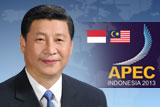
President Xi visits Indonesia, Malaysia, attend APEC summit
Oct 2 to 3: Pay State Visit to Indonesia
Oct 4 to 5: Pay State Visit to Malaysia
Oct 6 to 8: Attend the 21st economic leaders' meeting of APEC forum and meet with global leaders in Bali, Indonesia
Forum
Xi makes a historic trip to the land where countless generations of Chinese have emigrated to, settled down, and melded into.
ASEAN members take lead from Indonesia being the largest of them all in many ways. China's relationship with it must get better.

